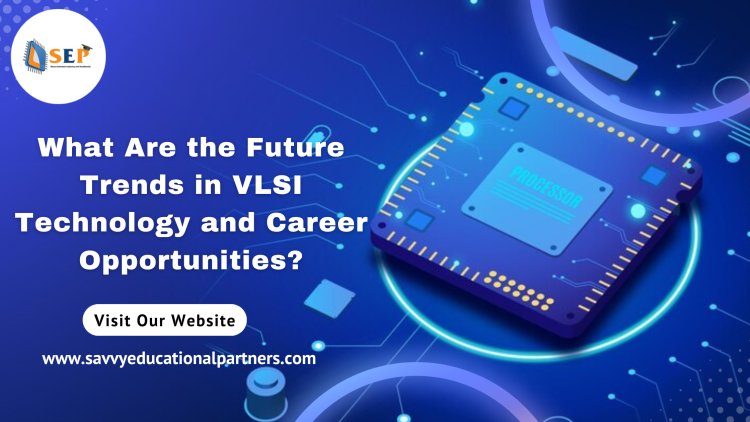What Are the Future Trends in VLSI Technology and Career Opportunities?

What Are the Future Trends in VLSI Technology and Career Opportunities?
VLSI (Very-Large-Scale Integration) technology has revolutionized the electronics industry by enabling the integration of thousands of transistors on a single chip. This advancement has led to more powerful, compact, and energy-efficient electronic devices. As we look towards the future, VLSI technology continues to evolve, shaping the way we interact with technology and creating exciting career opportunities for professionals in the field.
Future Trends in VLSI Technology
-
Advancements in Semiconductor Materials
Traditional silicon-based semiconductors are gradually being supplemented by new materials like graphene and gallium nitride (GaN). These materials offer superior electrical properties and can operate at higher frequencies and temperatures. As the industry pushes for more efficient and faster chips, the adoption of these advanced materials will play a crucial role in achieving next-generation performance.
-
Integration of Artificial Intelligence (AI)
AI and machine learning algorithms are increasingly being integrated into VLSI designs. This trend is driven by the need for chips that can handle complex data processing tasks more efficiently. AI-enhanced VLSI designs are expected to improve the performance of various applications, including autonomous vehicles, smart devices, and real-time data analysis systems.
-
Emergence of 3D Integrated Circuits (3D ICs)
3D IC technology involves stacking multiple layers of silicon wafers to create a single, vertically integrated circuit. This approach allows for greater functionality and performance in a smaller footprint, reducing the distance data must travel between components. 3D ICs are anticipated to become more prevalent as the demand for compact, high-performance devices increases.
-
Advancements in Quantum Computing
Quantum computing represents a paradigm shift from classical computing, promising exponential increases in processing power. VLSI technology is playing a crucial role in developing quantum processors, with researchers focusing on creating stable qubits and integrating them into functional quantum circuits. The development of quantum VLSI chips will have a profound impact on fields such as cryptography, material science, and complex simulations.
-
Focus on Low Power and Energy Efficiency
As electronic devices become more pervasive, there is a growing emphasis on developing low-power, energy-efficient VLSI circuits. Techniques such as power gating, clock gating, and dynamic voltage and frequency scaling (DVFS) are being refined to minimize energy consumption. These advancements are crucial for extending battery life in portable devices and reducing the environmental impact of electronic systems.
-
Increased Use of Software-Defined Hardware
Software-defined hardware (SDH) allows for the reconfiguration of hardware functionalities through software updates. This flexibility is particularly useful in applications requiring frequent updates or customization. VLSI designs incorporating SDH principles are expected to drive innovation in areas such as network infrastructure, telecommunications, and consumer electronics.
Career Opportunities in VLSI Technology
-
VLSI Design Engineer
VLSI design engineers are responsible for creating and optimizing integrated circuits. Their work involves designing complex chip architectures, simulating circuit behavior, and ensuring the design meets performance and reliability standards. With the increasing complexity of VLSI systems, demand for skilled design engineers is expected to grow.
-
Verification Engineer
Verification engineers play a critical role in ensuring that VLSI designs function correctly and meet specifications. They develop test plans, create simulation models, and perform rigorous testing to identify and resolve issues before the design is manufactured. As VLSI technology evolves, the need for verification engineers with expertise in new testing methodologies and tools will rise.
-
Physical Design Engineer
Physical design engineers focus on the layout and fabrication of integrated circuits. They work on translating logical designs into physical layouts, considering factors such as signal integrity, power distribution, and thermal management. Advances in 3D ICs and new semiconductor materials will create new challenges and opportunities in physical design.
-
Field Application Engineer
Field application engineers (FAEs) provide technical support to customers, helping them integrate VLSI solutions into their products. FAEs work closely with design teams to address technical challenges, optimize performance, and ensure successful product deployment. With the growing adoption of advanced VLSI technologies, FAEs will be crucial in bridging the gap between design and application.
-
Research and Development (R&D) Specialist
R&D specialists in VLSI technology focus on exploring new materials, design methodologies, and fabrication techniques. They work on cutting-edge projects to push the boundaries of what is possible with VLSI technology. Opportunities in R&D are expected to expand as the industry seeks to drive innovation and address emerging challenges.
-
Product Manager
Product managers oversee the development and commercialization of VLSI products. They work with engineering teams, market analysts, and customers to define product requirements, manage development timelines, and ensure successful market entry. As VLSI technology continues to evolve, product managers will play a key role in shaping the future of electronic devices.
Conclusion:
The future of VLSI technology is marked by rapid advancements and exciting possibilities. From new semiconductor materials and AI integration to the rise of 3D ICs and quantum computing, the field is poised for significant growth. As technology evolves, so too do the career opportunities for professionals in VLSI. Embracing these trends and staying abreast of industry developments will be crucial for those looking to make their mark in this dynamic and ever-evolving field.
For more information
Call: +91 6366995222
Email: info@savvyeducationalpartners.com
Website: https://www.savvyeducationalpartners.com/

 Savvyeducationalpartners
Savvyeducationalpartners 
















